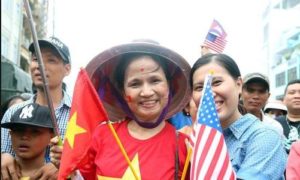Vietnamese refugees face deportation from US
 The Trump administration is seeking to deport thousands of Vietnamese refugees who have committed minor crimes even though they were ostensibly protected by a 2008 non-refoulement agreement.
The Trump administration is seeking to deport thousands of Vietnamese refugees who have committed minor crimes even though they were ostensibly protected by a 2008 non-refoulement agreement.
In the forty years since the end of the Vietnam War, refugees fleeing the Communist government in Vietnam have been treated differently to refugees from most other countries.
If they committed felonies, they would not be deported. This position acknowledged the fact that these people came to the US because American forces fought a devastating war in their home country.
The exception recognised that America owed a measure of compassion to those who lost their homeland in the wake of the communist invasion of South Vietnam, and the United States military intervention to resist it.
The move has drawn criticism from human rights groups, from Vietnamese-Americans and also from the US ambassador to Vietnam, Ted Osius, who resigned over the issue.
Nearly a dozen Vietnamese refugees were sent to the Socialist Republic of Vietnam beginning late last year.
But last month, the Trump administration was forced to temporarily halt its plans to deport thousands more in response to a class-action lawsuit and resistance from the Vietnamese government.
Refusing to concede defeat, the administration is using long-term detention as a means of punishing those it cannot immediately remove.
A spokeswoman for the US Department of Homeland Security said that such a policy was necessary to “protect our communities by ensuring we can detain convicted violent criminal aliens and keep them out of American communities”
But advocates claim these refugees have already been punished for their crimes at the state or federal level, and most of them moved on to find stable employment and to raise families.
Human rights groups say they now, they face a second and indeterminate sentence, though they have not committed new crimes.
Human rights researcher Dr Ian Pringle says the plight of these Vietnamese refugees may seem unsurprising in an era of Muslim bans, deep cuts in new refugee admissions and the separation of families at the Mexican border.
“But this stands out for how radically this administration has departed from the bipartisan consensus supporting Cold War refugees since the end of the Vietnam War,” Dr Pringle said.
“From the fall of Saigon in 1975 until 1995, the United States did not recognize the Socialist Republic of Vietnam, and so it was impossible to deport people there.
“Even after diplomatic relations were restored in 1995, the American government chose not to deport Vietnamese refugees with felony records, and the Communist government in Hanoi showed no interest in receiving refugees whom it considered citizens of a country that no longer existed,” he said.
Laurie Nowell
AMES Australia Senior Journalist












